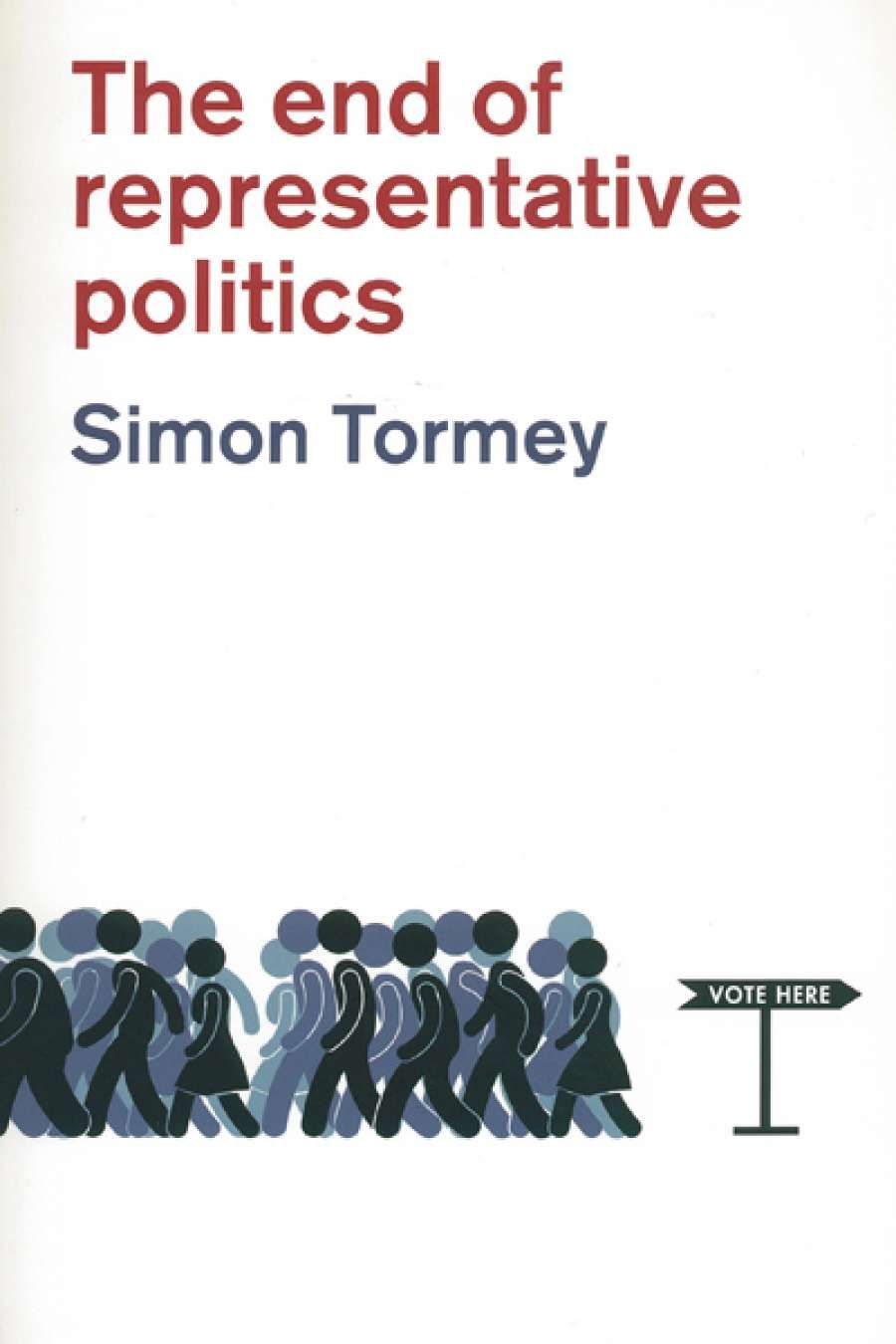
- Free Article: No
- Contents Category: Politics
- Custom Article Title: Dennis Altman reviews 'The End of Representative Politics' by Simon Tormey
- Book 1 Title: The End of Representative Politics
- Book 1 Biblio: Polity, $35.95 pb, 200 pp, 9780745681962
Similar arguments were central to the New Left critique of representative politics almost five decades ago, and it is surprising that as good a scholar as Tormey ignores this. The radicals of the 1960s also questioned the role of conventional parties and representative institutions, and turned to various forms of direct action, some of which are echoed in movements such as Occupy. In 1974 Bob Catley and Bruce McFarlane published the book From Tweedledum to Tweedledee which made many of the criticisms Tormey describes as applying today.
Some of the current political landscape has been shaped by people who experienced the 1960s firsthand, even if those of us who remember them do so with the exaggerated romanticism of nostalgia. (One strange exception is our universities, which, contrary to the trends Tormey identifies, are becoming more hierarchical and command-driven.)
The idealism of the 1960s was largely supplanted by the resilience of conventional politics. Nor have activists abandoned the representative mode; there has been a steady move from social movement into political parties, sometimes new, as with the Greens, sometimes reinvigorated, as with the Scottish Nationalists, or as factions within existing parties, as is true of the American Tea Party. Tom Hayden, one of the founders of Students for a Democratic Society, became a Democratic congressman, and Bob Catley went on to become the Labor member for Adelaide in 1990.
These examples do not necessarily disprove Tormey’s argument, but, while he discusses the Tea Party, there is an odd lacuna around the ongoing trajectory of the New Left generation which often embraced ‘the long march through institutions’, to quote Rudi Dutschke, as a way to effect change.
‘The questions Simon Tormey poses in The End of Representative Politics are crucial, and we need more political scientists willing to grapple with them’
Of course the revolution in electronic and social media this century has opened up political possibilities in quite dramatic ways. Tormey discusses these changes judiciously; as he writes: ‘The perception, increasingly, is that citizens don’t need representatives and politicians to make themselves heard or to act. They can do it for themselves in the expectation that others will want to join in or support their efforts …’
Tormey’s examples come both from countries with strong traditions of liberal democracy and those without, which seems to me problematic. While there are passing references to the Arab Spring, and its global impact, how far are developments in countries with long traditions of authoritarian rule comparable to those in countries like Australia, with long traditions of representative government?
Tormey himself poses this question, and does so after a fascinating case study of popular movements in contemporary Spain. From this he concludes that political parties are not dying but that they are changing in fundamental ways: ‘We have left the cosy familiarity of “cartels”, monopolies and duopolies, and found ourselves in an unruly, noisy street party.’ But the street party in Madrid – or on Wall Street – is not equivalent to that in Tahrir Square.
 Simon Tormey
Simon Tormey
I have the advantage of writing this after the British elections, when, against all predictions, a single long-established party regained government on its own terms. Of course, the British electoral system facilitated this, and it may well change under pressure from those it clearly disenfranchised. But in countries with long traditions of liberal democracy the old structures seem more solid than Tormey suggests, symbolised by the possibility of a dynastic struggle next year between Hillary Clinton and Jeb Bush.
Parties that emerge as alternatives to the established ones face the dilemma of whether to grow by becoming more mainstream, or to retain their purity as gadflies within the polity. The Australian Greens face this dilemma; the French National Front has moved so quickly to embrace the centre that their current leader has had to depose her father because he threatened her electoral chances.
‘Tormey disagrees with the lamentations about growing apathy and disinterest in politics’
Where traditions of liberal democracy are weaker, the street party is too often usurped by the military, as has happened recently in both Egypt and Thailand. Tormey points to the many forces which are changing the political landscape, in particular the breakdown of class identities and the growth of individualism. But I suspect he under-estimates the sheer inertia of the traditional party system, and the ability of old-style politicians to adapt, as in the cynical way in which the two major parties in Australia cooperated to cut the size of the Tasmanian lower house and thus partially lock out the Greens.
As Tormey acknowledges, the huge changes wrought by social media can facilitate both new mobilisations from below and increased surveillance from above. His analysis is most persuasive when he accepts that we are seeing both a decline of traditional political loyalties, and a desire to enter the system, often through new and ephemeral parties such as the Palmer United Party.
In her praise for the book, the British feminist Hilary Wainwright writes: ‘a new form of democracy is being born and with it a more pervasive democracy for which we all have responsibility.’ While I cannot share this optimism, I would recommend The End of Representative Politics as an important stimulus to thinking through the current state of our political institutions, and the possibilities for transcending them. Even the author would admit that the title of his book is slightly exaggerated.


Comments powered by CComment